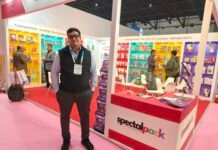In line with last year’s commitment, diversified Indian conglomerate ITC went beyond plastic neutrality in 2021-22 by orchestrating an integrated solid waste management programme that incorporates unique and multidimensional initiatives. The company collected and sustainably managed more than 54,000 tonnes of plastic waste across 35 states and union territories. The amount of plastic waste managed exceeded the amount of plastic packaging utilised by ITC during the year, enabling the company to achieve the milestone of plastic neutrality.
For over a decade, the company has been running a holistic 360-degree solid waste management programme based on the principles of a circular economy and encompasses the entire waste value chain.
For a company with large-scale operations in FMCG and hospitality, going beyond plastic neutrality is a commendable feat. The milestone is yet another reflection of ITC’s commitment to augmenting environmental and social capital, in line with chairman Sanjiv Puri’s sustainability 2.0 vision, which calls for inclusive strategies to support even more livelihoods and pursue newer pathways to fight climate change.
ITC has achieved this milestone by scaling up its holistic initiatives focused on in-house innovation, robust waste management programmes centred around source segregation and sustainable business practices with mass impact.
“Over the decades, ITC has made industry-leading efforts in end-to-end waste management. Through a large-scale and integrated solid waste management programme, ITC moved beyond plastic neutrality this year. In addition, the company is also using cutting-edge innovations to develop sustainable alternatives to plastic packaging for the industry. This milestone has been possible due to the untiring efforts of all our partners and I would take this opportunity to congratulate them for supporting Team ITC’s aspirations of contributing meaningfully to address some of the major sustainability challenges facing the country. The efforts to move beyond plastic neutrality and sustainable management of waste will continue apace in the years ahead as part of our sustainability 2.0 agenda.” said Sanjiv Rangrass group head, ITC Life Sciences and Technology, Central Projects, EHS and Quality Assurance, ITC.
ITC has adopted a multi-pronged approach to reduce plastic in the company’s operations spanning fast-moving consumer goods, hotels, paperboards and packaging. This includes creating robust next-generation environment-friendly packaging solutions, mega-scale waste collection programmes under its flagship waste management initiative ‘ITC WOW – Well-Being Out of Waste’, and focused interventions in rural areas. A culture of plastic-free operations – in line with its philosophy of ‘Responsible Luxury’ to eliminate single-use plastic usage in ITC hotels, and innovative models for sustainability which has plastic reduction and management at their core. Within its operations, ITC has been recycling more than 99% of the waste for more than a decade.
ITC WOW, which enables the creation of a clean and green environment through community partnerships, has covered 18 million citizens across 46.7 lakh households in India. Currently operational in Bengaluru, Mysuru, Hyderabad, major towns of Telangana, Coimbatore, Chennai, Tirupur, Cochin, Muzaffarpur, Delhi and several districts of Andhra Pradesh, the initiative has raised awareness in over 52 lakh school children and 2,000 corporates since its inception. The initiative has also created sustainable livelihoods for over 16900 waste collectors by facilitating an effective collection system collaborating with municipal corporations.
In addition to WOW, a separate ITC programme on solid waste management (SWM), which deals with both wet and dry waste, is operational in 17 districts of 9 states, covering 14.6 lakh households. Acknowledging the challenges concerning disposal and recycling of multi-layered plastic, ITC has also pioneered a first of its kind sustainable and inclusive multi-layered plastic (MLP) management model in Pune.
The company’s targeted waste management initiatives ensure that lesser waste goes into landfills and enable larger value recovery from waste, thereby creating sustainable livelihoods for waste collectors while creating additional income streams from collecting and sorting plastic waste. The company’s waste management programmes cover all categories of plastic waste, including flexibles, rigids and tetra packs.
Being India’s leading paperboards and specialty paper company, ITC has also introduced several sustainable alternatives to plastic packaging. Leveraging the cutting-edge research and development capabilities of ITC Life Sciences and Technology Centre (LSTC), Bengaluru, the company has developed multiple sustainable packaging solutions for the industry, including the recyclable barrier board under the ‘Filo Series’ – an innovative substitute for single-use plastics in the food services segment, as well as the biodegradable ‘Omega Series’, launched as an alternative to plastic-coated containers and cups. Some of the other innovations by the company include ‘Bioseal’ for replacing polyethylene coating, ‘Oxyblock’ for improving barrier properties and recyclability, and the ‘Green Stiffner’ – a first of its kind compostable and recyclable solution.
In December last year, ITC’s Paperboards and Specialty Papers Division (PSPD), also collaborated with Invest India, a non-profit venture under the Department for Promotion of Industry and Internal Trade, Ministry of Commerce and Industry, to launch the ‘ITC Sustainability Innovation Challenge’, which is aimed at supporting and crowd-sourcing innovative technology-based solutions from the start-up ecosystem on sustainable packaging and smart waste management.












